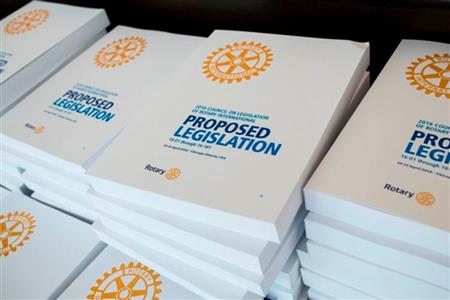Did you ever wonder how Rotary gets its rules for operation of clubs, the district and Rotary International? Did you ever wonder how you could get some of those rules changed, or suggest a better idea for how Rotary operates around the world? Well then, you’re in luck! This article is about the 2018 Rotary Council on Resolutions. Next month we’ll discuss the Council on Legislation. These two councils are the mechanism for adopting resolutions suggesting ideas to the Rotary International Board of Directors, and for adopting legislation which changes the constitutional documents of Rotary International.
A resolution is a request to the RI Board or The Rotary Foundation Trustees to take an action that is outside the purview of the constitutional documents (the RI Articles and Bylaws). Ideally, a resolution affects the Rotary world, rather than address local or administrative issues.
The Council on Resolutions (“COR”) meets every year. These meetings are not in-person, but rather consist of on-line consideration of and voting upon resolutions made by clubs and districts around the world. The deadline for submitting resolutions is the end of the Rotary fiscal year on June 30. The next deadline is June 30, 2019.
Clubs can propose resolutions, which must be voted on or endorsed by the clubs in its district at its district conference, a district legislation meeting or through a ballot by mail. Districts may also propose resolutions, which must also be voted on at the district conference. More information on proposing resolutions can be found in the pdf file here.
Once proposed, voted upon and submitted to Rotary International, these resolutions are considered by the COR (subject to some consolidation of requests seeking similar action).
This year’s consideration took place on-line between October 15 and November 15. Fifty-five resolutions were considered. You can see each resolution and the voting results here.
As you will see, the resolutions were widely varied in their requested action. One requested that the RI Board consider reaffirming the importance of service in the Object of Rotary. That resolution was adopted. Another sought to have the RI Board consider designating mandatory data fields in Rotary Club Central. That request was rejected.
There were some interesting resolutions this year. One which was adopted was to request the RI Board to provide a club guide for mandatory and discretionary practices in light of the many recent changes to permissible club meeting flexibility. Another which passed requested the RI Board to recommend that clubs display the Four-Way Test.
So, what happens to a resolution which passes? These are provided to the RI Board (or The Rotary Foundation Board, as may be), and the board gives them its consideration. These are recommendations or suggestions to the board to consider items of interest to clubs and districts around the world. They are not mandates and they are not requirements that the Board must implement…the Board merely must give them consideration.
We will contrast these suggestions in resolutions with the actual requirements imposed by Legislation in next month’s article.
In the meantime, if you are interested please review the resolutions considered this year and I’d be happy to talk to you about my vote and consideration of each of them.
Each rotary district is entitled to select a representative to these two counsels. For this resolution/legislation cycle, District 5400 selected me to serve as the representative, and I’m available to make a presentation to your club on the process and the topics at issue. As a sneak preview, if you’re interested on seeing the upcoming legislation, you can access them at this link, which will allow you to download the pdf files of the legislation proposed for 2019, which will be considered starting on April 15, 2019.
